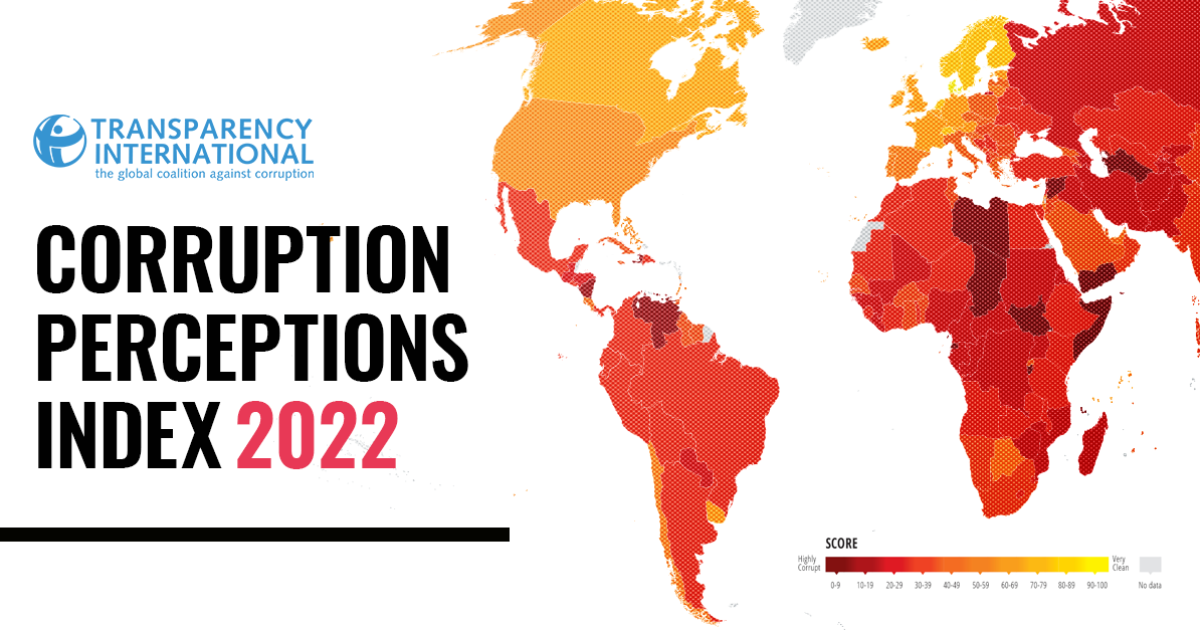Charles Ellinas*
Transparency International has just released its 2022 annual ‘Corruption Perceptions Index (CPI)’ report. It makes grim reading for Cyprus, dropping down the rankings yet again.
This is an independently produced report, based on consistent criteria, and as such it provides impartial assessment of how the countries of the world have been performing over the last 11 years, since the Index was first published.
The CPI ranks 180 countries and territories around the world by their perceived levels of public sector corruption, scoring on a scale of 0 (highly corrupt) to 100 (no corruption or very clean). Cyprus’ score in 2022 was 52, just above the mid-point, but well below the average score for Europe, which was 66. Denmark ranked top with 90. Finland and New Zealand were second with a score of 87. Germany was 9th and France 21st with scores 79 and 72 respectively.
In 2013 Cyprus was ranked 31st. It dropped to 38th position in 2018 and by the end of 2022 it was down to 51st position along with Greece. Among European countries, Cyprus is in joint 22nd position, doing better than Malta and Eastern European countries Croatia, Romania, Bulgaria, and Hungary. Nothing to be proud of, especially as we are at the bottom among Western European countries, with whom we aspire to be compared and strive to do business with.
In other words, during the last ten years it carried on a downwards spiral, dropping on average 2 places per year, a consequence of ever-increasing corruption. And if anything, it has been worsening. Cyprus dropped by 7 places during the first five years, but it tumbled down by 13 places during the last five years. Among European countries, this is the worst performance, apart from Hungary that dropped by 30 places.
Transparency International points out that corruption undermines governments’ ability to protect people and erodes public trust. It recommends that “governments must open up space to include the public in decision-making – from activists and business owners to marginalised communities and young people. In democratic societies, the people can raise their voices to help root out corruption and demand a safer world for us all.”
The CPI report makes key recommendations. Dealing with the threats that corruption poses to peace and security must be a core business of political leaders. Prioritising transparency, oversight and the full, meaningful engagement of civil society, governments should:
- Reinforce check and balances and promote separation of powers
- Share information and uphold the right access to it
- Limit private influence by regulating lobbying and promoting open access to decision-making
- Combat transnational forms of corruption
Two of CPI’s recommendations stand-out for Cyprus:
- Anti-corruption agencies and oversight institutions must have sufficient resources and independence to perform their duties. Governments should strengthen institutional controls to manage risk of corruption in defence and security.
- Ensure the public receives accessible, timely and meaningful information, including on public spending and resource distribution. There must be rigorous and clear guidelines for withholding sensitive information, including in the defence sector.
Even in Europe “Undue influence over decision-making, poor enforcement of integrity safeguards and threats to the rule of law continue to undermine governments’ effectiveness.” Even more so in Cyprus.
Transparency International concludes that “In this complex environment [created by the global crisis], fighting corruption, promoting transparency and strengthening institutions are critical to avoid further conflict and sustain peace.” Let’s hope that Cyprus’ next President will heed these recommendations and restore some much-needed integrity and credibility.
*Charles Ellinas is Senior Fellow at the Global Energy Centre of the Atlantic Council. This piece is also posted on the blog of the Cyprus Economic Society.




